
Unit 4 Encouragement 昵图网wuu.nipic,.com BY:hu N02910082570
Unit 4 Encouragement

Study Focus 1.Understand why we should praise. 2.Learn to use the“As..,so..”structure. 3.Illustrate the effect of praise with one of your personal experiences. 4.Learn to develop a paragraph by listing or examples. 5.Explain the purpose of creating the Hello Day
1. Understand why we should praise. 2. Learn to use the “As…, so…” structure. 3. Illustrate the effect of praise with one of your personal experiences. 4. Learn to develop a paragraph by listing or examples. 5. Explain the purpose of creating the Hello Day. Study Focus
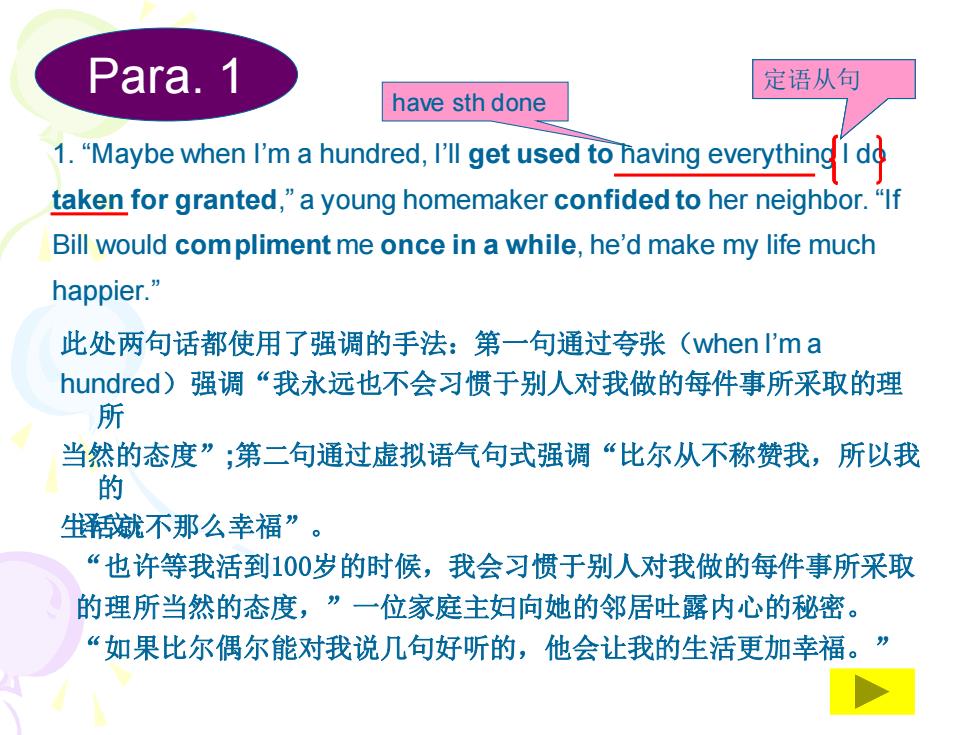
Para.1 定语从句 have sth done 1."Maybe when I'm a hundred,I'll get used to having everythingI do taken for granted,"a young homemaker confided to her neighbor."If Bill would compliment me once in a while,he'd make my life much happier.” 此处两句话都使用了强调的手法:第一句通过夸张(when'ma hundred)强调“我永远也不会习惯于别人对我做的每件事所采取的理 所 当然的态度”;第二句通过虚拟语气句式强调“比尔从不称赞我,所以我 的 生就不那么幸福”。 “也许等我活到100岁的时候,我会习惯于别人对我做的每件事所采取 的理所当然的态度,”一位家庭主妇向她的邻居吐露内心的秘密。 “如果比尔偶尔能对我说几句好听的,他会让我的生活更加幸福
1. “Maybe when I’m a hundred, I’ll get used to having everything I do taken for granted,” a young homemaker confided to her neighbor. “If Bill would compliment me once in a while, he’d make my life much happier.” Para. 1 此处两句话都使用了强调的手法:第一句通过夸张(when I’m a hundred)强调“我永远也不会习惯于别人对我做的每件事所采取的理 所 当然的态度”;第二句通过虚拟语气句式强调“比尔从不称赞我,所以我 的 生活就不那么幸福”。 译文: “也许等我活到100岁的时候,我会习惯于别人对我做的每件事所采取 的理所当然的态度,”一位家庭主妇向她的邻居吐露内心的秘密。 “如果比尔偶尔能对我说几句好听的,他会让我的生活更加幸福。” 定语从句 have sth done
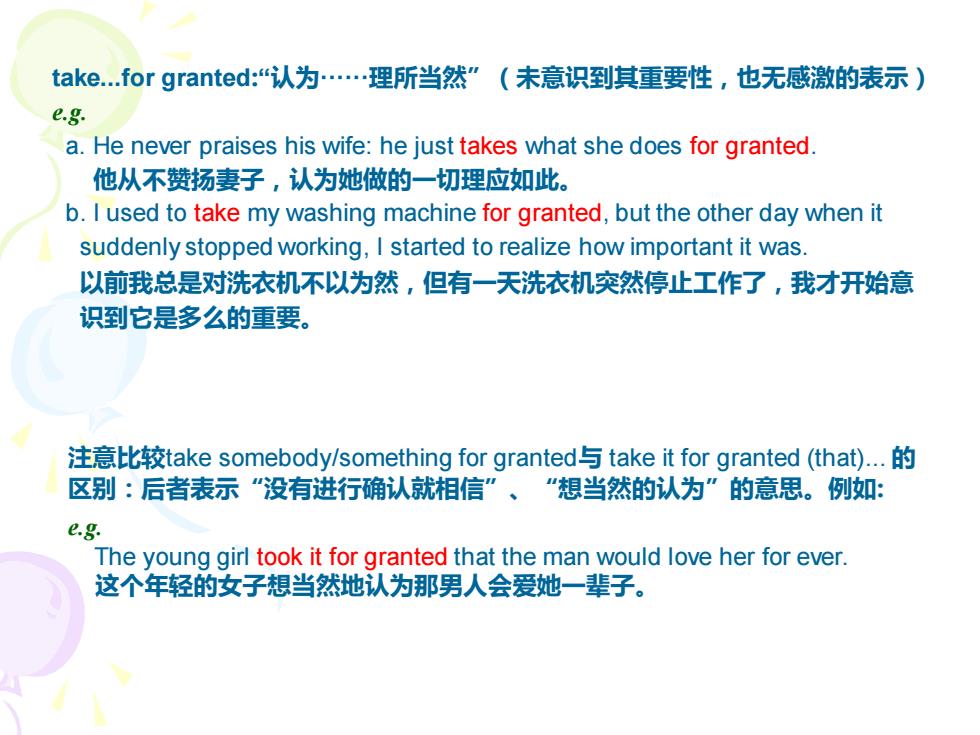
take.for granted:“认为理所当然”(未意识到其重要性,也无感激的表示) e.g. a.He never praises his wife:he just takes what she does for granted. 他从不赞扬妻子,认为她做的一切理应如此。 b.I used to take my washing machine for granted,but the other day when it suddenly stopped working,I started to realize how important it was. 以前我总是对洗衣机不以为然,但有一天洗衣机突然停止工作了,我才开始意 识到它是多么的重要。 注意t比较take somebody/something for granted.与take it for granted(that)..的 区别:后者表示“没有进行确认就相信”、“想当然的认为”的意思。例如: e.g. The young girl took it for granted that the man would love her for ever. 这个年轻的女子想当然地认为那男人会爱她一辈子
take...for granted:“认为······理所当然”(未意识到其重要性,也无感激的表示) e.g. a. He never praises his wife: he just takes what she does for granted. 他从不赞扬妻子,认为她做的一切理应如此。 b. I used to take my washing machine for granted, but the other day when it suddenly stopped working, I started to realize how important it was. 以前我总是对洗衣机不以为然,但有一天洗衣机突然停止工作了,我才开始意 识到它是多么的重要。 注意比较take somebody/something for granted与 take it for granted (that)... 的 区别:后者表示“没有进行确认就相信”、“想当然的认为”的意思。例如: e.g. The young girl took it for granted that the man would love her for ever. 这个年轻的女子想当然地认为那男人会爱她一辈子
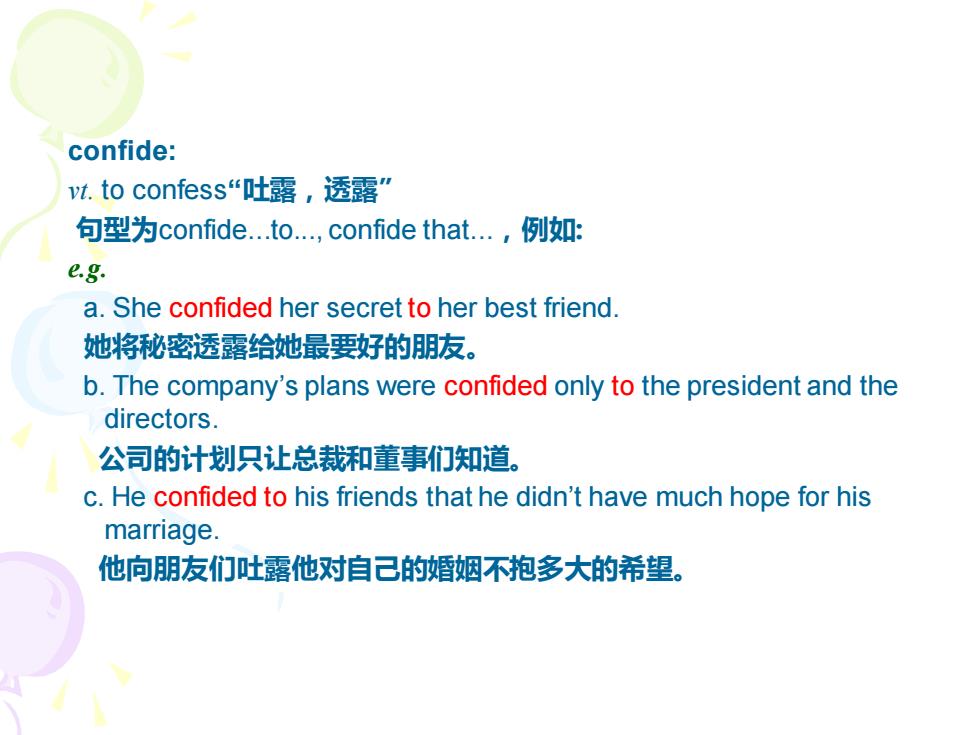
confide: vt.to confess“吐露,透露” 句型为confide..to.,confide that..,例如: e.g. a.She confided her secret to her best friend. 她将秘密透露给她最要好的朋友。 b.The company's plans were confided only to the president and the directors. 公司的计划只让总裁和董事们知道。 c.He confided to his friends that he didn't have much hope for his marriage. 他向朋友们吐露他对自己的婚姻不抱多大的希望
confide: vt. to confess“吐露,透露” 句型为confide...to..., confide that...,例如: e.g. a. She confided her secret to her best friend. 她将秘密透露给她最要好的朋友。 b. The company’s plans were confided only to the president and the directors. 公司的计划只让总裁和董事们知道。 c. He confided to his friends that he didn’t have much hope for his marriage. 他向朋友们吐露他对自己的婚姻不抱多大的希望
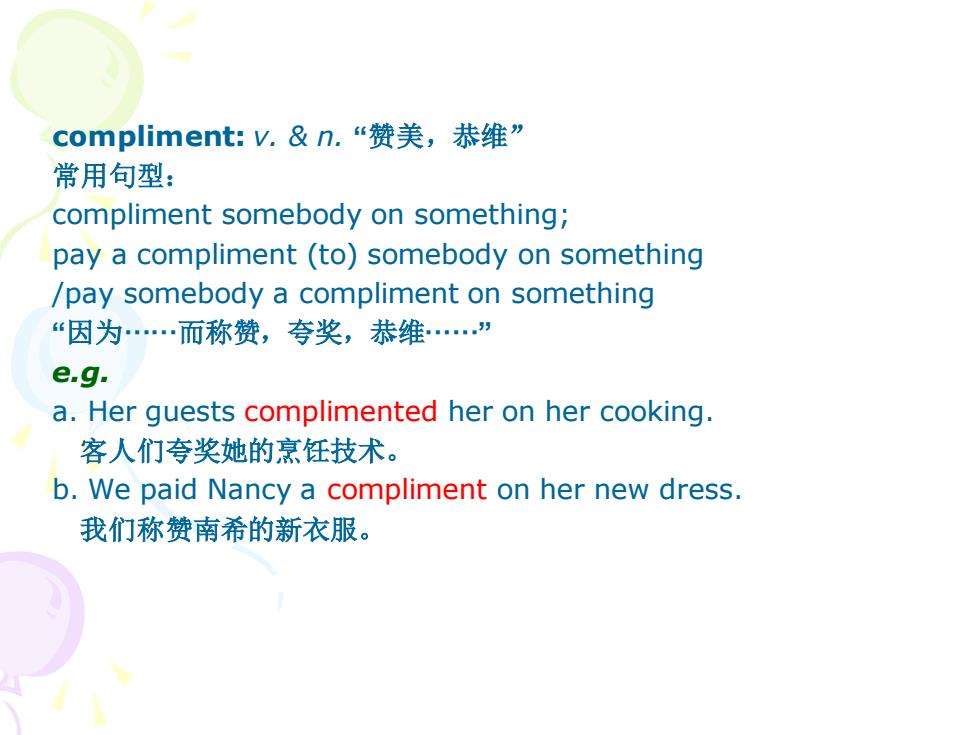
compliment:V.&n.“赞美,恭维” 常用句型: compliment somebody on something; pay a compliment (to)somebody on something /pay somebody a compliment on something “因为…而称赞,夸奖,恭维…” e.g. a.Her guests complimented her on her cooking. 客人们夸奖她的烹饪技术。 b.We paid Nancy a compliment on her new dress. 我们称赞南希的新衣服
compliment: v. & n. “赞美,恭维” 常用句型: compliment somebody on something; pay a compliment (to) somebody on something /pay somebody a compliment on something “因为······而称赞,夸奖,恭维······” e.g. a. Her guests complimented her on her cooking. 客人们夸奖她的烹饪技术。 b. We paid Nancy a compliment on her new dress. 我们称赞南希的新衣服
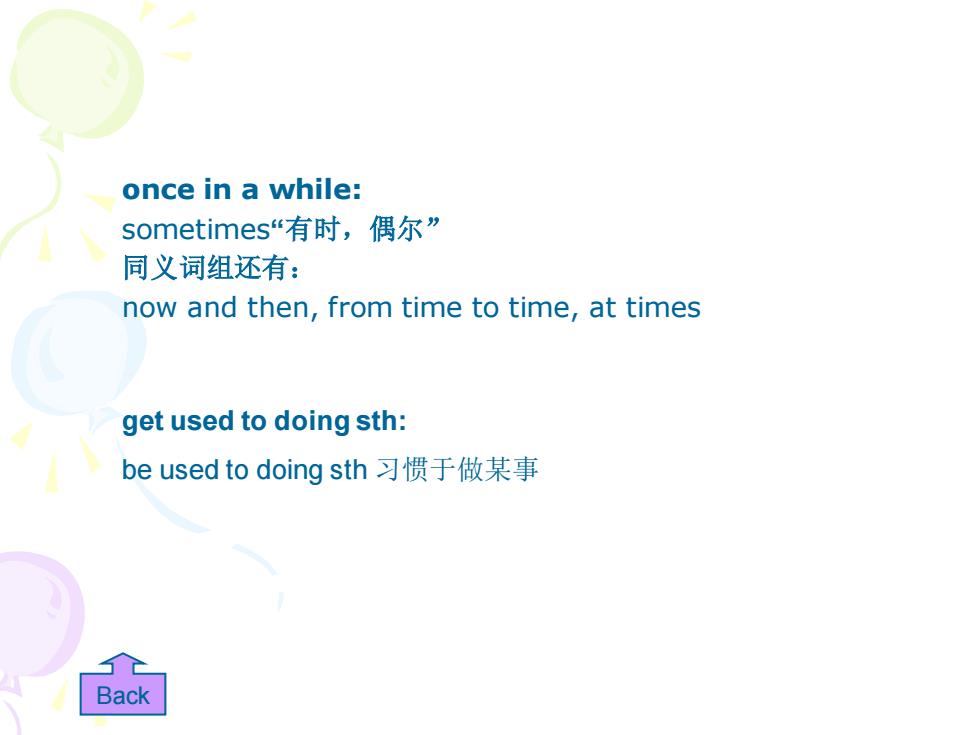
once in a while: sometimes“有时,偶尔” 同义词组还有: now and then,from time to time,at times get used to doing sth: be used to doing sth习惯于做某事 5金 Back
once in a while: sometimes“有时,偶尔” 同义词组还有: now and then, from time to time, at times get used to doing sth: be used to doing sth 习惯于做某事 Back